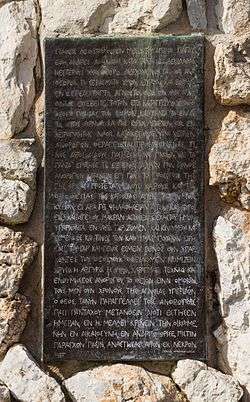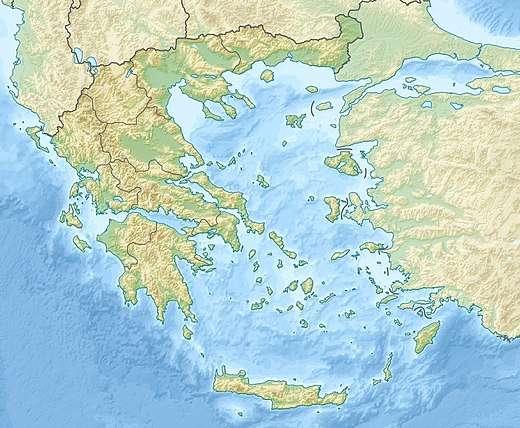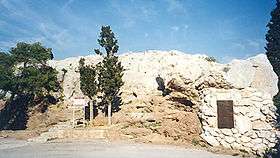Acts 17
Acts 17 is the seventeenth chapter of the Acts of the Apostles in the New Testament of the Christian Bible. It records the second missionary journey of Paul, together with Silas and Timothy. The book containing this chapter is anonymous, but early Christian tradition uniformly affirmed that Luke composed this book as well as the Gospel of Luke.[1]
| Acts 17 | |
|---|---|
 Bronze plaque dedicated to the visit of apostle Paul to the Areopagus Hill in Athens. It cites the text of Acts 17:22-32. Image taken in 2016. | |
| Book | Acts of the Apostles |
| Category | Church history |
| Christian Bible part | New Testament |
| Order in the Christian part | 5 |
Text
The original text was written in Koine Greek and is divided into 34 verses.
Textual witnesses
Some early manuscripts containing the text of this chapter are:
- Codex Vaticanus (AD 325–350)
- Codex Sinaiticus (330–360)
- Codex Bezae (c. 400)
- Codex Alexandrinus (400–440)
- Papyrus 127 (5th century; extant verses 1–10)
- Codex Laudianus (c. 550)
Locations

This chapter mentions the following places (in the order of appearance):
Timeline
The second missionary journey of Paul took place in c. AD 49.[2]
Distances
The apostles traveled from Philippi to Thessalonica, a distance of 161 km (on modern roads), and from Thessalonica to Berea (modern Veria), which is 72 km. Paul then traveled to 'the sea', which would have been at least 42 km at the nearest point, and then south to Athens, approximately 300 km (most likely by sea, though it is possible that he walked the coastal road instead). The journey 'by night' from Thessalonica to Berea (Acts 17:10) presumably took more than one night.
The 'Babbler' (Verse 18)
Addressing the Areopagus
The speech, known as the Areopagus sermon, refers to a sermon or explanation delivered by Apostle Paul at the Areopagus in Athens, and described in Acts 17:16–34.[4][5] The Areopagus sermon is the most dramatic and fullest reported speech of the missionary career of Saint Paul and followed a shorter address in Lystra Acts 14:15–17.[6] Paul explained concepts such as the resurrection of the dead and salvation, in effect a prelude to the future discussions of Christology. According to the record, after the sermon, a number of people became followers of Paul. These included a woman named Damaris, and Dionysius, a member of the Areopagus. This latter has at times been suggested as Dionysius the Areopagite, but that may be a historical confusion.[7]
Verse 28
- for in Him we live and move and have our being, as also some of your own poets have said, 'For we are also His offspring'.[8]
- "For in Him we live and move and have our being": is quoted from Cretica (Κρητικά) by Epimenides as found by J. Rendel Harris based on a 9th-century Syriac commentary by Isho'dad of Merv on the Acts of the Apostles.[9]
- "'For we are also His offspring'": Paul might take this quotation from two poets:[10]
- Aratus, probably of Tarsus[10] or Soli in Cilicia[11] (~272 BC), thus Paul's countryman. The words τοῦ γὰρ καὶ γένος ἐσμέν ("For we too are his offspring") are found in a didactic poem titled "Phenomena", comprising the main facts of astronomical and meteorological science at that time, starting with an invocation to Zeus.[10][11][lower-alpha 1]
- Cleanthes (~300 BC), of Assos in Mysia, who wrote ἐκ σοῦ γὰρ γένος ἐσμέν ("For we thine offspring are") in a hymn to Zeus.[10][11][lower-alpha 2]
See also
Notes
-
- "From Zeus begin; never let us leave
- His name unloved. With Him, with Zeus, are filled
- All paths we tread, and all the marts of men;
- Filled, too, the sea, and every creek and bay;
- And all in all things need we help of Zeus,
- For we too are his offspring."
- —Aratus, Phænomena 1–5. Cited in Ellicott's Bible Commentary for English Readers. Acts 17.
-
- "Most glorious of immortals, many-named,
- Almighty and for ever, thee, O Zeus,
- Sovran o’er Nature, guiding with thy hand
- All things that are, we greet with praises. Thee
- ’Tis meet that mortals call with one accord,
- For we thine offspring are, and we alone
- Of all that live and move upon this earth,
- Receive the gift of imitative speech."
- —Cleanthes, Hymn to Zeus. Cited in Ellicott's Bible Commentary for English Readers. Acts 17.
References
- Holman Illustrated Bible Handbook. Holman Bible Publishers, Nashville, Tennessee. 2012.
- John Arthur Thomas Robinson (1919–1983). "Redating the New Testament". Westminster Press, 1976. 369 pages. ISBN 978-1-57910-527-3
- Acts 17:18
- Christianity: an introduction by Alister E. McGrath pages 137–141, 2006, ISBN 1-4051-0901-7
- Theology of the New Testament by Udo Schnelle (Nov 1, 2009) ISBN 0801036046 page 477
- Mercer Commentary on the New Testament by Watson E. Mills 2003 ISBN 0-86554-864-1 pages 1109–1110
- Paul: A Brief History by Robert Paul Seesengood 2010 ISBN 1-4051-7890-6 page 120
- Acts 17:28 NKJV
- Harris, J. Rendel. "A Further Note on the Cretans", Expositor Apr. 1907, 332–337. Quote:
- J. Rendel Harris' hypothetical Greek text:
Κρῆτες, ἀεὶ ψευδεῖς, κακὰ θηρία, γαστέρες ἀργαί.
Ἀλλὰ σὺ γ᾽ οὐ θνῇσκεις, ἕστηκας γὰρ ζοὸς αίεί,
Ἐν γὰρ σοὶ ζῶμεν καὶ κινύμεθ᾽ ἠδὲ καὶ ἐσμέν.- Translation:
Cretans, always liars, evil beasts, idle bellies.
But you are not dead: you live and abide forever,
For in you we live and move and have our being. - Ellicott, C. J. (Ed.) Ellicott's Bible Commentary for English Readers. Acts 17. London : Cassell and Company, Limited, [1905-1906] Online version: (OCoLC) 929526708. Accessed on April 28, 2019.
- Meyer's NT Testament. Acts 17. Accessed on April 24, 2019.
External links
- Acts 17 King James Bible - Wikisource
- English Translation with Parallel Latin Vulgate
- Online Bible at GospelHall.org (ESV, KJV, Darby, American Standard Version, Bible in Basic English)
- Multiple bible versions at Bible Gateway (NKJV, NIV, NRSV etc.)
.jpg)
